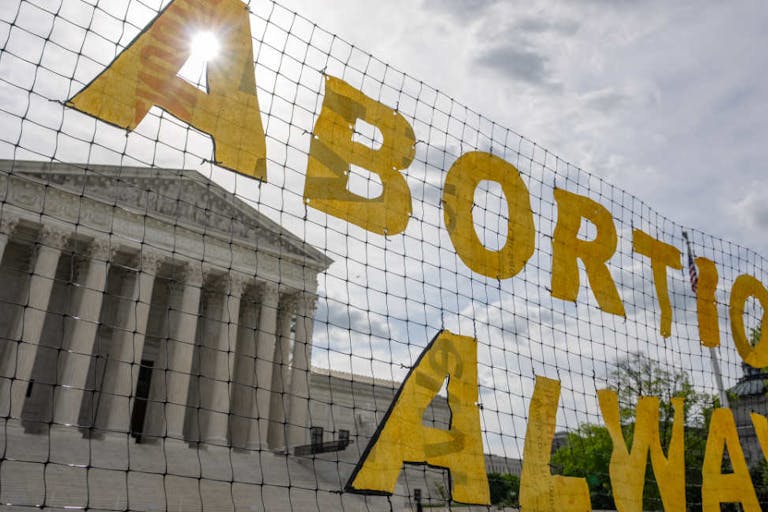
A growing number of Americans call themselves ‘pro-choice’ – but what’s really behind it?
Nancy Flanders
·
In the 19th Century, many politicians didn’t think fighting slavery should be priority. Some still don’t.
It’s estimated that between 11 and 15 million people came across the Atlantic as slaves. Crammed into ships reeking of urine, vomit, and feces, many didn’t survive the trip. Some of those who did would arrive in America.
Congress banned the importation of new slaves in 1807, but legal slavery would continue for over half a century. Helping it survive was a powerful lobby that had considerable influence in the Democratic Party, with pre-Civil War Democrats adopting a pro-slavery plank in their party’s platform. Even among northern Democrats who didn’t represent slaveholding areas, there were some who felt the issue wasn’t important enough to fight over.
A lot has changed since then; sadly, some things haven’t. Although slavery is now outlawed, it’s still around, with human traffickers buying and selling victims like property. That doesn’t just happen overseas: a surprising amount occurs in America. And just as slavery still exists, there are still politicians who aren’t serious about fighting it.
Kevin D. Williamson wrote earlier this year about Ima Matul, an Indonesian teen who was lured to the US and forced into brutal captivity. Her plight wasn’t unique. To help those like her, Sen. John Cornyn introduced the Justice for Victims of Trafficking Act in January. The bill increased penalties on traffickers while putting their seized assets into a fund to benefit victims. It initially had bipartisan support, but that didn’t last.
A provision stipulated that the victims’ fund couldn’t pay for abortions, which stood to reason: the goal was to help trafficking victims, not kill them. Put simply, no child should have to pay for her father’s crimes.
And abortion doesn’t only threaten those in the womb. Studies have shown that post-abortive women face an elevated risk of suicide, while others are devastated by feelings of sadness and loss.
Senate Minority Leader Harry Reid still wasn’t impressed. He demanded that the pro-life rule be removed and then joined with other senators to stonewall the legislation for weeks when that didn’t happen.
They only relented after Republicans refused to confirm attorney general nominee Loretta Lynch, agreeing to a compromise in which health services would be covered by tax dollars—funds that are already barred from directly paying for abortions. While stalling a bill meant to helping trafficking victims produced some harsh criticism, there was one constituency that applauded the move.
Planned Parenthood is the abortion industry’s biggest player, ending over three hundred thousand young lives every year. It’s also a powerful figure in Washington, and it called on its allies to block the Justice for Victims of Trafficking Act until abortion funding was added. It’s not surprising that the abortion industry would show a lack of concern for victims of violence and coercion on Capitol Hill; they’ve done it in their clinics for years.
Article continues below
Dear Reader,
In 2026, Live Action is heading straight where the battle is fiercest: college campuses.
We have a bold initiative to establish 100 Live Action campus chapters within the next year, and your partnership will make it a success!
Your support today will help train and equip young leaders, bring Live Action’s educational content into academic environments, host on-campus events and debates, and empower students to challenge the pro-abortion status quo with truth and compassion.
Invest in pro-life grassroots outreach and cultural formation with your DOUBLED year-end gift!
Trafficking victims are expected to produce revenue, something pregnancy interferes with. That’s why many of them get taken to abortion providers–whether they want to go or not. You can listen below to one of them describe what it’s like.
In a video produced by the group A21 Campaign, a former prostitute named Nicole talks about life as a trafficking victim. In addition to being beaten and threatened with a hot clothes iron, she was forced to have two abortions, an experience she called “the hardest.”
While the idea of aiding traffickers is revolting to most, there are those who aren’t as troubled by it. As Live Action has proven, some of them end up working at Planned Parenthood.
Live Action investigators visited multiple Planned Parenthood in 2011 with hidden cameras. Posing as pimps using underage prostitutes, the investigators found that Planned Parenthood staff were ready to accommodate them. Clinic director Amy Woodruff bluntly declared, “If they’re 14 and under, just send them right there if they need an abortion, OK?” The fact that the girls “can’t speak English” and “won’t know what’s going on” wasn’t a problem for her.

That’s in line with how other Planned Parenthood staff have reacted to evidence of abuse. Live Action founder Lila Rose went to a Planned Parenthood facility in 2008 claiming to be a minor who’d been impregnated by her 31 year-old boyfriend. An employee there was ready to help hide the relationship, advising Rose to lie about her boyfriend’s age when seeking an abortion.

Others have documented similar behavior. Life Dynamics recorded telephone calls to Planned Parenthood clinics from a woman claiming to be 14 and pregnant with her adult boyfriend’s child. On literally hundreds of calls, staff were willing to arrange an abortion that would conceal the abuse and allow it to continue. That attitude might have something to do with why real abusers turn to the abortion industry for help. You can read a list here of over fifty other sexual predators who used abortion to hide their crimes.
Not that any of this made a difference to Planned Parenthood’s friend’s in Congress. Despite proof that some of its staff had been willing to help human traffickers, Sen. Richard Blumenthal and ten other pro-abortion senators labeled calls for Planned Parenthood to be investigated as “a witch hunt.” They also weren’t concerned by an open letter from former clinic director Abby Johnson and six other ex-employees stating that Planned Parenthood’s polices fail to stop coercion and abuse.
The fact that slavery still exists is shameful. That it’s enabled by a publicly funded organization is even worse. You can help change that by signing Live Action’s petition asking Congress to hold Planned Parenthood accountable and end its half billion dollar subsidy. You can also demand tougher anti-coercion laws to help protect women and girls from abuse.
Unfortunately, too many politicians aren’t taking human trafficking and the role that abortion plays in it seriously. It’s time to let them know that victims deserve to be a priority.
Live Action News is pro-life news and commentary from a pro-life perspective.
Contact editor@liveaction.org for questions, corrections, or if you are seeking permission to reprint any Live Action News content.
Guest Articles: To submit a guest article to Live Action News, email editor@liveaction.org with an attached Word document of 800-1000 words. Please also attach any photos relevant to your submission if applicable. If your submission is accepted for publication, you will be notified within three weeks. Guest articles are not compensated (see our Open License Agreement). Thank you for your interest in Live Action News!

Nancy Flanders
·
Opinion
Angeline Tan
·
Issues
Angeline Tan
·
Guest Column
Emily Berning
·
Opinion
Nancy Flanders
·
Opinion
Mark Wiltz
·
Human Interest
Adam Peters
·
Human Interest
Adam Peters
·
Opinion
Adam Peters
·
International
Adam Peters
·
International
Adam Peters
·